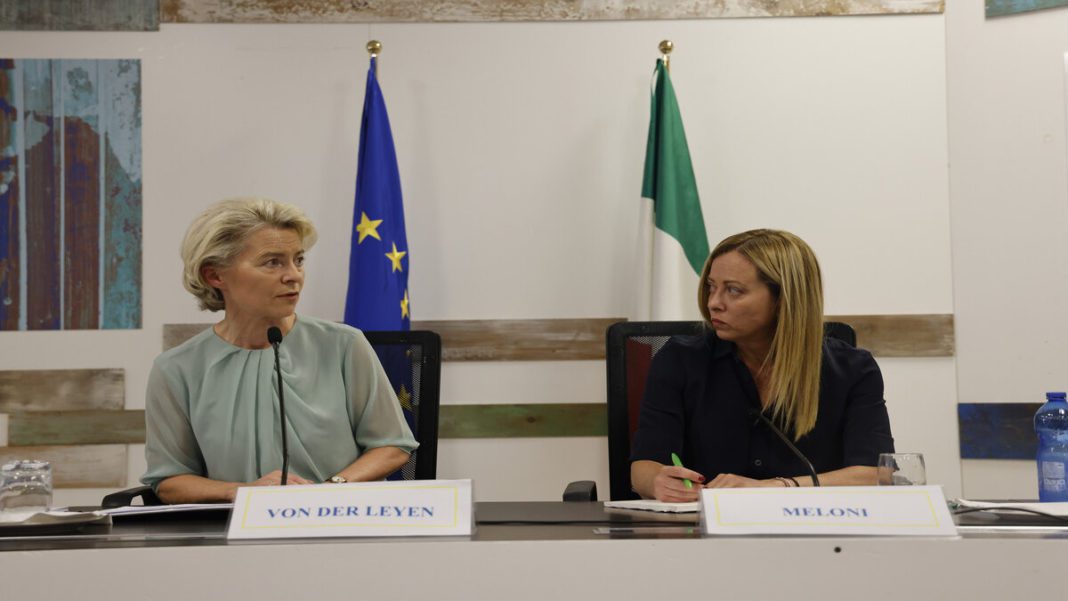ITALY: Italy’s Prime Minister Giorgia Meloni has stated that European nations must work together “to stop departures [from Africa]” and promptly deport asylum applicants who are denied asylum, as she believes they “threaten the future of Europe” after a significant influx of refugees arrived on Lampedusa in the past week.
Giorgia Meloni, accompanied by Ursula von der Leyen, President of the European Commission, visited the small Sicilian island, which has long been the initial destination for those undertaking the perilous sea journey from North Africa.
During their three-hour visit, which included a visit to an overcrowded reception centre and a site near the port containing the remnants of fragile migrant boats, almost 8,500 people arrived on the island within three days last week—surpassing the island’s resident population of 6,000.
Tragically, a baby born aboard a vessel carrying 40 passengers passed away shortly after birth, and the infant was laid to rest in a white coffin at the island’s cemetery on Saturday morning. Additionally, last week, a five-month-old boy lost his life during a rescue operation.
In recent days, there were chaotic scenes at the reception centre, designed to accommodate only 400 people, with migrants resorting to sleeping on the litter-filled streets outside and others attempting to escape over a fence.
When Meloni and Von der Leyen arrived, most of the migrants had already been relocated from the island to facilities in Sicily or mainland Italy, and the vicinity around the centre had been tidied up to appear almost pristine.
Meloni, whose far-right government came to power in October of last year, stated that the flood threatened “the future of Europe” and that “serious solutions” were required, including a crackdown on people smugglers, the expeditious deportation of illegal immigrants, and the prompt implementation of an agreement signed this year with Tunisia.
“If anyone thinks that this crisis we are facing could be just resolved within Italian borders, it would be a very big mistake because this problem involves everyone and needs to be tackled by everyone,” Meloni said.
“I continue to say that we will never resolve it by talking only about redistribution [of migrants]—the only way to resolve it is to stop departures,” Meloni added.
Von der Leyen pledged rapid deportations for those denied asylum and a strong crackdown on the “brutal business” of people smuggling. She stated, “We will decide who comes to the European Union and under what circumstances. Not the smugglers.”
She detailed a 10-point plan, which involved offering Italy assistance in handling new arrivals while “exploring options to expand existing naval missions in the Mediterranean or to work on new ones”. Von der Leyen also encouraged member states to utilise a mechanism allowing them to voluntarily accept migrants to alleviate the strain on Italy.
However, individuals are still arriving on the island, with many originating from Tunisia, where In July, Meloni and Von der Leyen inked a contentious £105 million agreement aimed at curbing irregular migration. No funds have been transferred as of yet, and there has been criticism regarding the nearly 70% increase in the number of migrants crossing from Tunisia to Italy in the months following the deal, a fact that experts have attributed to favourable weather conditions.
So far in 2023, over 127,000 people have set foot on Italian soil, more than twice as many as during the same period last year.
The recent crisis has sparked a renewed discussion regarding how responsibility is allocated among EU member states and has prompted inquiries into the viability of agreements with North African nations.
Lampedusa, situated closer to Tunisia than Sicily, has grappled with North African migration for more than three decades. However, the island’s residents are becoming increasingly impatient. They’ve voiced concerns and protested, fearing that it might transform into a “tent city.”
Meloni, whose election promise was to put an end to illegal immigration, is pinning her hopes on the agreement with Tunisia as a potential solution. The EU has emphasised that the designated budget for Tunisia will be disbursed, and they are presently refurbishing 17 vessels for Tunisian authorities to utilise in search and rescue missions.
However, a contingent of MEPs from the European Parliament was denied entry into the country, raising fresh concerns about President Kais Saied’s commitment to addressing human rights issues. Saied has previously stated that Tunisia should not serve as Europe’s border guard.
The EU migration pact, championed by Meloni, enjoys support from the rest of Europe, where migration is considered a pivotal issue, particularly with forthcoming elections in Poland and the Netherlands.
Additionally, the agreement with Tunisia includes an extra £150 million to assist with economic reforms and foster industrial partnerships with Europe, encompassing green energy initiatives.
Also Read: G7 Summit: Canada’s PM Trudeau Criticises Italy’s PM Meloni over LGBTQ Rights



